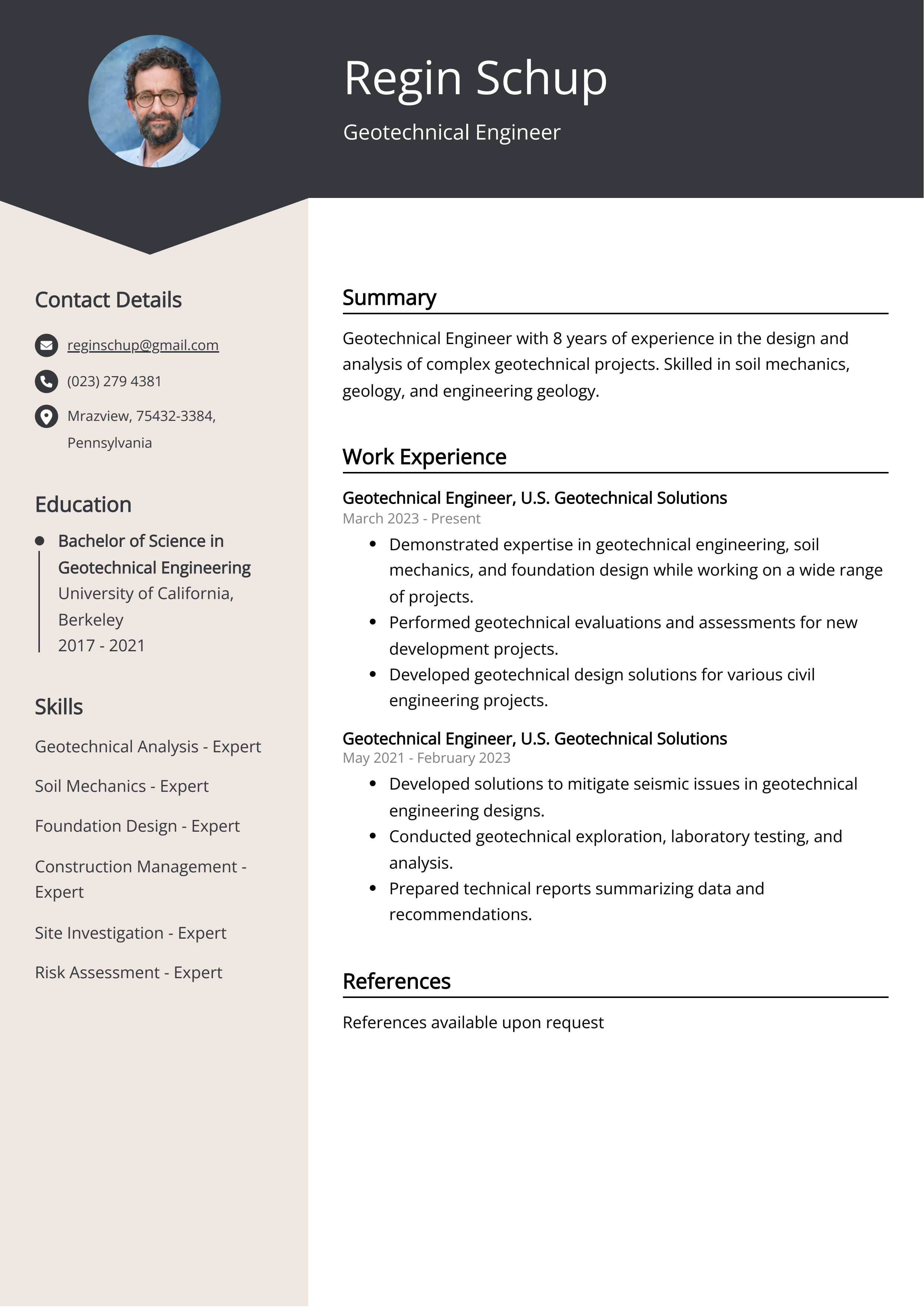Our Geotheta Diaries
Our Geotheta Diaries
Blog Article
See This Report about Geotheta
Table of ContentsGeotheta for BeginnersThe Facts About Geotheta RevealedAll about GeothetaGeotheta for BeginnersThe 7-Minute Rule for Geotheta

They perform site examinations, collect examples, perform lab examinations, and analyze information to review the suitability of the ground for building and construction projects - Engineer of Record. Based on their searchings for, geotechnical engineers provide suggestions for foundation design, incline security, maintaining structures, and mitigation of geotechnical dangers. They work together with various other specialists, such as designers, architectural designers, and building teams, to make sure that geotechnical considerations are integrated into the total project design and application
By assessing the actions and residential or commercial properties of soil and rock, they can determine possible geotechnical threats such as landslides, soil negotiation, or incline instability. Their expertise helps prevent failures or accidents that could endanger lives and home. Here are some thorough obligations and duties of a geotechnical designer: Website Examination: Geotechnical engineers conduct website investigations to collect information on subsurface conditions.
They interpret the data to comprehend the residential properties and actions of the dirt and rock, including their toughness, permeability, compaction qualities, and groundwater problems. Geotechnical Evaluation and Style: Geotechnical engineers analyze the data gathered during site investigations to evaluate the stability and viability of the site for building tasks. They perform geotechnical calculations and modeling to examine aspects such as bearing capability, negotiation, incline security, lateral earth stress, and groundwater flow.
Getting My Geotheta To Work
Foundation Design: Geotechnical designers play an important function in creating foundations that can securely support the intended framework. They assess the soil problems and tons needs to establish the ideal foundation type, such as superficial foundations (e.g., grounds), deep foundations (e.g (https://hub.docker.com/u/geotheta)., heaps), or specialized methods like dirt enhancement. They take into consideration variables such as negotiation limitations, bearing capacity, and soil-structure interaction to establish optimal foundation designs
They assess construction strategies, display site tasks, and perform area evaluations to verify that the style recommendations are adhered to. If unforeseen geotechnical issues develop, they examine the situation and give suggestions for remediation or adjustments to the design. Threat Analysis and Mitigation: Geotechnical designers examine geotechnical hazards and threats linked with the job website, such as landslides, liquefaction, or dirt erosion.

Cooperation and Interaction: Geotechnical designers work closely with various other professionals involved in a job, such as engineers, structural engineers, and building and construction teams. Efficient communication and cooperation are necessary to integrate geotechnical factors to consider into the overall task layout and construction procedure. Geotechnical engineers supply technological know-how, response queries, and guarantee that geotechnical demands are fulfilled.
The Ultimate Guide To Geotheta
Here are some kinds of geotechnical designers: Foundation Designer: Foundation engineers specialize in creating and examining structures for frameworks. They examine the dirt problems, tons demands, and website characteristics to figure out the most proper foundation kind and design, such as shallow foundations, deep foundations, or specialized techniques like pile foundations.
They examine the aspects affecting incline security, such as dirt properties, groundwater conditions, and slope geometry, and develop methods to stop incline failings and mitigate threats. Earthquake Designer: Earthquake engineers focus on assessing and making structures to stand up to seismic forces. They analyze the seismic threat of a website, evaluate soil liquefaction capacity, and develop seismic style requirements to guarantee the safety and security and strength of structures during earthquakes.
They perform field testing, collect examples, and examine the gathered data to identify the dirt properties, geologic formations, and groundwater problems at a website. Geotechnical Instrumentation Engineer: Geotechnical instrumentation designers focus on monitoring and measuring the habits of soil, rock, and structures. They mount and preserve instrumentation systems that check aspects such as soil negotiation, groundwater levels, incline activities, and architectural displacements to assess efficiency and supply early cautions of prospective issues.
All About Geotheta
They carry out tests such as triaxial examinations, consolidation examinations, direct shear examinations, and permeability examinations to collect data for geotechnical evaluation and layout. Geosynthetics Engineer: Geosynthetics engineers focus on the layout and application of geosynthetic products, such as geotextiles, geogrids, and geomembranes. They utilize these products to enhance soil stability, strengthen inclines, provide drainage options, and control disintegration.
They have a tendency to be investigative individuals, which suggests they're intellectual, introspective, and investigative. They are curious, systematic, sensible, analytical, and logical. Several of them find more are also social, indicating they're kind, generous, cooperative, person, caring, handy, empathetic, tactful, and friendly. Does this audio like you? Take our totally free occupation examination to figure out if geotechnical engineer is among your leading profession matches.
In the workplace setting, geotechnical engineers utilize specialized software application devices to do computations, develop designs, and assess information. They prepare reports, evaluation job specs, communicate with clients and group participants, and coordinate job tasks. The office setting offers a conducive environment for research, evaluation, and collaboration with other specialists included in the project.
Geotheta Can Be Fun For Anyone
They regularly go to project websites to perform site examinations, evaluate geotechnical problems, and gather data for analysis. These check outs entail traveling to various places, occasionally in remote or challenging terrains. Geotechnical engineers might carry out dirt tasting, conduct tests, and screen construction tasks to make sure that the geotechnical aspects of the job are being executed appropriately.
Geotechnical designers additionally function in specialized geotechnical research laboratories. Geotechnical research laboratory designers function thoroughly in these settings, dealing with testing tools, operating instruments, and tape-recording data.
Report this page